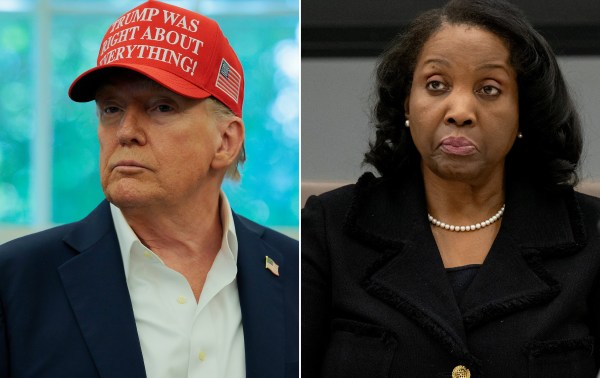In June 1982, at the height of the Cold War, President Ronald Reagan addressed the British Parliament ahead of a trip to Bonn, West Germany, for a NATO summit. He announced that political leaders back home were studying how America could best contribute to the “global campaign for democracy,” stating, “We must be staunch in our conviction that freedom is not the sole prerogative of a lucky few but the inalienable and universal right of all human beings.” The end result of that initiative was the National Endowment for Democracy (NED), established by Congress in 1983 to support U.S.-friendly democracies abroad.
At the time NED aimed to protect democracy mainly from communism. But it also played a critical role as a lifeline to dissidents behind the Iron Curtain. After the USSR fell, NED transformed itself into a broader effort to assist countries that shared America’s values and interest in self-government, the rule of law, and support for private enterprise and business.
Today, NED is under fire. Critics want to cut its funding or even eliminate it entirely. But pulling the plug on NED would hand a victory to authoritarian powers like China, strengthen anti-U.S. alliances, and leave American businesses more exposed to corrupt, rigged markets dominated by our adversaries. In today’s global competition, those are risks we can’t afford.
Today critics argue that NED is wasteful, duplicative, and supports a kind of democracy that is out of sync with their notions of American government. The Trump administration opposes NED and has threatened to cut funding entirely. Many Republicans in Congress disagree with the administration and want funding to continue. But much depends on whether critics have an accurate understanding of what NED does—and how its leadership, acting on its own initiative, has already made significant reforms to streamline operations, sharpen strategic focus, and ensure that NED’s work clearly advances America’s national interest in line with the Trump administration’s goals.
The president and CEO of NED, Damon Wilson, has made this point crystal clear. “We’ve undertaken an institution-wide reform to ensure NED remains the most effective and efficient partner for advancing freedom and U.S. interests,” he told me. “We welcome the opportunity to work with the administration and lawmakers to drive results that matter for the American people.”
NED offers a powerful set of tools to strengthen America’s position in the world. First and foremost, it can bolster partners that not only share our values and practices of governance, but who can be relied upon to support the U.S, diplomatically. NED has throughout its history supported independent media and civic groups in Central Europe and elsewhere that have assisted in developing democratic governments that want to align themselves with the United States. Some of these countries, such as Poland and the Baltic states, became actual U.S. allies. Many others, such as Chile and Nigeria, are far more sympathetic to our interests and values than they would have been otherwise.
But soft power isn’t the only way NED helps Americans. It has also helped many U.S. companies expand their global reach. Because of NED’s support in helping build a cashless economy in Egypt—cutting down on corruption in transactions—American exporters now have more streamlined access to Egypt’s market, customers, and consumers, with Visa and Mastercard benefiting from increased sales and transactions.
In Colombia, NED programming created a unique tool, the Observatory for Private Investment, that monitors critical issues impacting companies operating in regions of the country most affected by conflict. This has helped U.S. businesses like Cargill, the Coca-Cola Company, PepsiCo, DirectTV, Starbucks, and thousands of entrepreneurs get access to essential information for risk analysis, investment decisions, social license to operate, expansion of operations, and tax benefits.
The bottom line: American firms and workers suffer when they are undercut by competition that relies on forced or child labor, or a tilted playing field. They need rule of law and a respect for contracts. In a world of rigged markets and authoritarian interference, NED helps ensure American businesses and workers face fairer competition—not markets distorted by authoritarian influence.
NED has been effective as well in countering the rise of authoritarianism. China, Russia, and Iran invest heavily in building networks and alliances that subvert democracy. These groups become agents of influence that they control, and which are used as weapons against the United States. This is happening all over the world, particularly in Asia, Africa, and Latin America. If NED were to disappear, countries such as China would face far fewer obstacles in spreading their authoritarian values, tightening their grip on fragile states, and turning those countries hostile to the United States.
Critics argue that NED is wasteful and duplicative. On the contrary, the elimination of much of the funding for this kind of work at the State Department and through the U.S. Agency for International Development (USAID) leaves NED as one of our only instruments for advancing American-style democracy, making it even more important.
Supporting NED does not mean opposing efforts to reform foreign aid programs. Many U.S. foreign aid programs in recent years were indeed poorly managed, focused too much on dubious and wasteful projects, and were disconnected from advancing America’s national interests. Even some past NED projects fell short. But that has changed. The leadership of NED has made it clear that they understand and appreciate the new environment. They have focused programs on U.S. interests, and are streamlining operations, reducing staff, and tightening spending.
America has long made investments in global stability and healthy markets that boost our prosperity. Those investments should be continued, for the sake of democracy—but also for the sake of America. If the administration succeeds in eliminating NED, this will create a national and economic security vacuum to be filled by China and our other adversaries. Thankfully, NED enjoys a long track record of bipartisan support in Congress. Funding NED safeguards economic freedoms and ultimately contributes to a more stable, predictable world—one where American values, businesses, and workers can thrive.









Please note that we at The Dispatch hold ourselves, our work, and our commenters to a higher standard than other places on the internet. We welcome comments that foster genuine debate or discussion—including comments critical of us or our work—but responses that include ad hominem attacks on fellow Dispatch members or are intended to stoke fear and anger may be moderated.
With your membership, you only have the ability to comment on The Morning Dispatch articles. Consider upgrading to join the conversation everywhere.